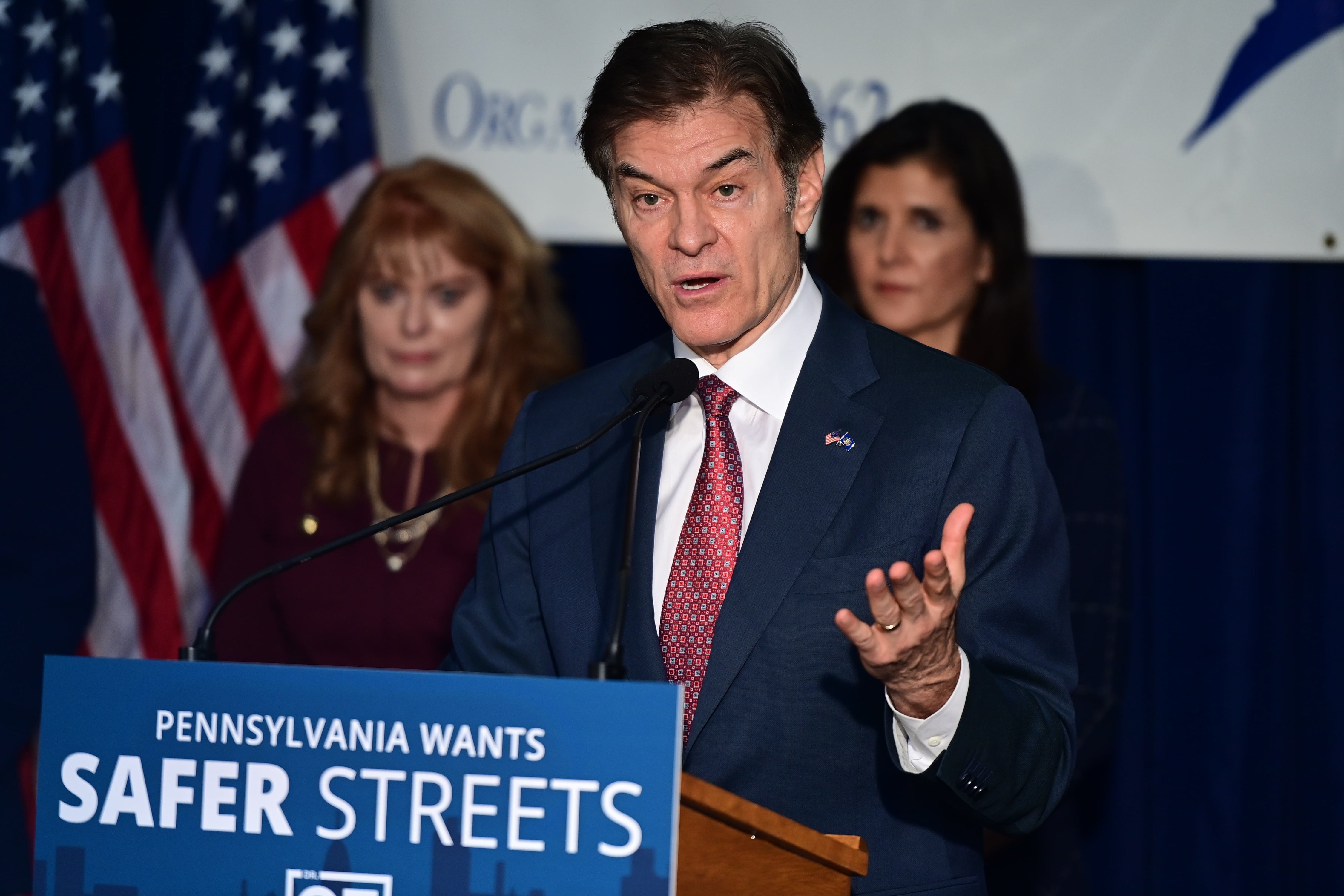Will Trump’s scandal-plagued Senate endorsements come back to bite the GOP?
Republicans seem eager to test the boundaries of electability this year, John Bowden writes

Your support helps us to tell the story
From reproductive rights to climate change to Big Tech, The Independent is on the ground when the story is developing. Whether it's investigating the financials of Elon Musk's pro-Trump PAC or producing our latest documentary, 'The A Word', which shines a light on the American women fighting for reproductive rights, we know how important it is to parse out the facts from the messaging.
At such a critical moment in US history, we need reporters on the ground. Your donation allows us to keep sending journalists to speak to both sides of the story.
The Independent is trusted by Americans across the entire political spectrum. And unlike many other quality news outlets, we choose not to lock Americans out of our reporting and analysis with paywalls. We believe quality journalism should be available to everyone, paid for by those who can afford it.
Your support makes all the difference.It seems like an almost comical question to ask: Does the quality of a candidate matter anymore?
But believe it or not that’s the question on the mind of experts on both sides of the aisle this year as a fresh crop of Republicansmake first-time bids for the US Senate buoyed by the support of Donald Trump, the man who took the presidency in 2016 amid shocking scandal and historic unpopularity.
Republicans seem eager to test the boundaries of electability this year. Where a typical midterm election would see a crop of ambitious GOP state-level officials making their first forays into national politics supported mostly by national Republicans and special interest groups, 2022 has instead seen the launch of Donald Trump’s effort to transform state governments as well as the national GOP House and Senate caucuses to mirror his image. A swath of disloyal, impeachment-supporting Republicans met their ends in primaries earlier this year, and now Mr Trump hopes to usher in his chosen loyalists into power this November.
But unfaltering loyalty to Mr Trump seems to have prevailed over traditional vetting procedures this time around, and as a result the GOP’s chances of breaking the Democratic Party’s Senate majority have wavered significantly while their opponents hungrily eye potential pickups in Ohio, Pennsylvania and North Carolina.
The Republican Party remains favoured to take the House, for a number of reasons; the redrawing of districts following the 2020 census benefited GOP candidates and the party as a whole, with many Republicans finding themselves in safer districts and many Democrats suddenly finding themselves in more competitive races. And the president’s job performance remains unpopular; Joe Biden’s approval ratings have rebounded somewhat following the passage of recent legislation like the CHIPS Act and Inflation Reduction Act, but it remains below 50 per cent in all available polling.
In the Senate, however, the party faces very different prospects. Redrawing districts won’t help the GOP here, and races take on a much higher profile that attracts greater scrutiny from industrious reporters and greater spending from interested political organisations.
That’s where the question of electability, or as it has come to be known this cycle, “candidate quality”, comes into play. A number of GOP candidates won their respective primaries with little more than the endorsement of a spurned and vengeful former president seeking to remake his party into a loyal throng of his followers ahead of his expected bid to retake power in 2024. And that simple fact has come back to bite the GOP as scandals and generally weak campaigns have turned a potential GOP wave in the upper chamber into an opportunity for their enemies.

Take Georgia, for starters. First-time political candidate Herschel Walker, a Heisman Trophy winner, won Mr Trump’s affection years ago and the two stoked a fast friendship; the 60-year-old Mr Walker is now mired in scandal as he faces accusations of paying for not one but two abortions for women — not to mention the multiple children he had not acknowledged having publicly before their discovery by reporters. His own son, influencer Christian Walker, has publicly denounced him and called his campaign a mistake.
Polls show Mr Walker taking a clear hit amid the newest wave of controversy: What had once looked like the GOP’s clearest chance for a Senate seat pickup has begun to evaporate as Sen Raphael Warnock builds a small but persistent lead. Mr Warnock, a practicing reverend, has largely abstained from hitting his opponent on many of the newest revelations, perhaps giving his opponent his only much-needed lifeline.

There’s Ohio, where Yale-educated and California-transplant JD Vance has put on a not-so-convincing man-of-the-people shtick and is struggling to build a clear lead over Tim Ryan in a state that Donald Trump won by eight points in 2020 and a similar margin in 2016. Mr Trump has made multiple visits to the state to boost Mr Vance’s campaign as Republicans attempt to hold an open Senate seat held by a retiring member of their party. Mr Vance’s favourables are underwater, and at a September rally attendees told The Independent that their support for Mr Vance largely boiled down to Donald Trump’s endorsement. The Hillbilly Ellegy author saw his primary bid surge after his endorsement from Mr Trump to the dismay (and anger) of Josh Mandel, his top opponent who was endorsed by other conservatives like Ted Cruz and had vied for Mr Trump’s support too.
Mr Vance leads his opponent, a sitting congressman overseeing a district that underwent historic economic collapse with the end of GM production at a major production plant, by less than two points according to a FiveThirtyEight average of polls.
Then there’s Pennsylvania, where Dr Mehmet Oz is running one of the objectively strangest campaigns for Senate in recent memory. A celebrity daytime TV host known for discussing his guests’ poop on-air, Dr Oz barely scraped out a win in Pennsylvania’s GOP primary before being relentlessly, unceasingly battered by Democratic opponent John Fetterman as an out-of-state phony who hawked unproven treatments as “miracle” cures on his show. At some points the Republican candidate’s greatest enemy has seemed to be his own communications staff, who allowed him to release a truly bizarre video about shopping for crudités without a shopping cart in a grocery store whose name Dr Oz could not pronounce.

That race has tightened up as well, thanks in this case due to concern about Mr Fetterman’s recovery from a stroke as well as a downright avalanche of negative coverage of said recovery (as well as other issues) by Fox News’s opinion side and a wave of Republican ad money to back it up.

And don’t forget Arizona: The Grand Canyon State, once thought to be a GOP bastion, where Blake Masters looks prepared to lose to incumbent Sen Mark Kelly. He’s trailing in just about every single poll, his favourables are underwater, and to tie it all off his campaign has made a series of increasingly questionable strategic choices. From letting the candidate appear in a bro-ey, pre-produced interview conducted by disgraced Republican House member Madison Cawthorn (who just soundly lost his own primary this year and is headed for early retirement) to attacking Mr Kelly for, of all things, serving his country as an astronaut, his team has ceaselessly raised the question of whether Mr Kelly realizes that the primary is over and he is now speaking to a general election audience.
If Republicans win control of the Senate this year, they will have proven one thing: Candidate quality is not the most important factor, not when it can be outspent, outFoxed and outorganised by various national GOP-aligned interests.
But if Democrats hold the upper chamber or expand their majority, either of which are more likely scenarios, they will prove something very different: That their opponents took the wrong lesson from the 2016 presidential election, and learned little if anything at all from 2020. They will prove that scandals still matter, the personalities and choices of individual candidates still matter, and perhaps the most important lesson of all: Not everyone can be Donald Trump.



Join our commenting forum
Join thought-provoking conversations, follow other Independent readers and see their replies
Comments